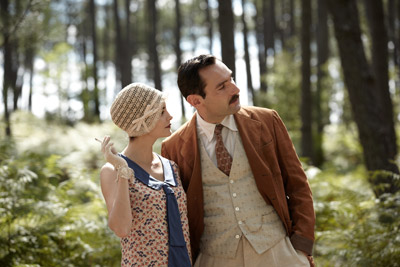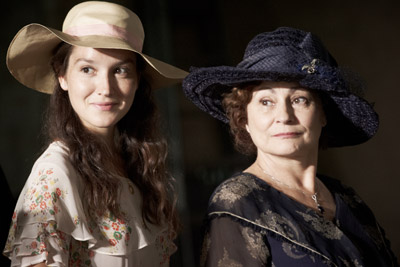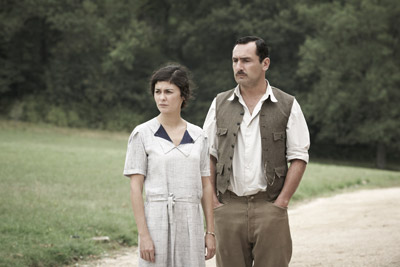Gilles Lellouche Thérèse D Interview

Gilles Lellouche Thérèse D Interview
Cast: Audrey Tautou, Gilles Lellouche
Director: Claude Miller
Genre: Drama
Running Time: 110 minutes
Synopsis: When a marriage of convenience proves to be less than that, the free spirited Thérèse finds herself stifled by the surroundings of 1920s provincial France and the intellectual mediocrity of her husband (Gilles Lellouche).
Based on the novel by François Mauriac, the film stars Audrey Tatou as the truly toxic Thérèse Desqueyroux. Her plans to end her life with husband Bernard are based on ending his life completely. After he accidently overdoses on his medicine (Fowler's Solution, which contains arsenic) his wife is inspired to replicate the treatment until suspicions are aroused and she faces trial for his attempted murder.
Release Date: April 11th, 2013
Interview with Gilles Lellouche
Question: This is your first dramatic role in a thirteen‐year career.
Gilles Lellouche: Jacques Maillot cast me in a dramatic role in a film for Arte called 'Un singe sur le dos". Claude gave me a second opportunity, and quite a big one considering that characters as complex and beautiful as Bernard are few and far between.
Question: How do you explain the fact that you weren't considered for serious roles earlier on?
Gilles Lellouche: I don't explain it. Even if I've had a lot of freedom in my career and I'd love to blow apart preconceived notions about my work, I can't go against how people perceive me. Claude Miller had the audacity to do that. I know that initially, his choice wasn't a given for everyone.
Question: When he talks about how you met at the Marrakech International Film Festival, he says he felt intimidated by the idea of giving you the script.
Gilles Lellouche: How backwards is that? That's how modest Claude is. He's a cinema giant; the whole world dreams of being approached by him, but there he is apologizing for doing it. I remember that first contact very well – very simple, very warm. I was crazy about the idea of being able to work with a director like him.
Question: Were you familiar with the book by François Mauriac?
Gilles Lellouche: I had read it in high school. I reread and rediscovered it. Claude explained how the structure was different from the one he and his co‐writer Natalie Carter adopted for the screenplay, and why they chose to treat the story in linear continuity instead of flashback. He insisted a lot on the fact that they had remained very faithful to the spirit of the novel, especially the dialogue, and he wanted me to immerse myself in that. I got a lot out of reading 'Thérèse Desqueyroux." Mauriac describes his characters with almost surgical precision.
 Question: In the film, Bernard Desqueyroux is much more human than in the book.
Question: In the film, Bernard Desqueyroux is much more human than in the book.Gilles Lellouche: And it was precisely because Claude wanted to humanize him that he chose me. He said it was obvious to him.
Question: How did you build your character?
Gilles Lellouche: Claude and I had the same vision of Bernard, the same questions. We didn't want to make him a total jerk, nor did we want to reduce his character to a bourgeois suffocating in convention. We didn't want to turn him into a boy incapable of breaking away from his mother, either. Bernard is above all a man in love. That's what we saw, reading between the lines.
Question: A man in love who never really comes out and says so.
Gilles Lellouche: He is incapable of opening up to other people. The last scene, when he takes Thérèse to Paris, is particularly touching to me. He asks her questions; he'd like to understand what makes her tick and finally have a talk with her. He is head over heels in love with her; he always has been, but no – he settles on saying he paid the bill. That scene brings tears to my eyes; it was a great help in building the character. Bernard's entire psychology is right there.
Question: You do an impressive job of portraying his inability to break free from family entrapments.
Gilles Lellouche: He is the kind of guy who is never on top, who is incomplete and perfectly aware of his limitations. He gives himself false airs of being a patriarch, like when he goes to get his sister Anne after she has run away and he pulls her by the hair. But Bernard doesn't scare anyone. It is only when he sees how thin Thérèse has become after being locked up that he finally understands the horror of the situation they are all in and becomes an adult. When we were shooting, Claude and I were very careful about knowing which Bernard we were talking about: the big oaf whose only desire is to go out hunting with his dogs? The bourgeois? The man in love? Little brushstrokes at every turn. Bernard can really be something! When Thérèse observes him during the procession, you can't help identifying with the coldness she feels for her husband. That ambiguity in each of the protagonists is what gives Claude's directing style all its subversiveness and power.
Question: The film as well as the book says a lot about the bourgeoisie of that era.
Gilles Lellouche: That horrible provincial life! Claude went at it with a machine gun and it's really delightful.
Question: You had never worked with Audrey Tautou before.
Gilles Lellouche: We immediately realised that we had set out on a rare adventure together. We were really excited and wanted to be up to the challenge. We saw each other every night of the shoot, had dinner and talked. I think Audrey is sensational in the role of Thérèse; she has a toughness, a darkness and depth that hadn't been seen in her before.
 Question: It was the first time you did a period film.
Question: It was the first time you did a period film.Question: Tell me more about the shoot.
Gilles Lellouche: The atmosphere was both studious and very relaxed. We were very close to Claude; we knew he was sick and could tell how much the film was doing him good. 'Thérèse Desqueyroux" was shot fifty miles from Bordeaux and he went there every morning on his way to the set for radiotherapy, which didn't keep him from sending us sweet little text messages. There was a triumphant force of humanity on that shoot.
Question: What was Claude Miller like as a director?
Gilles Lellouche: Like all great directors, Claude doesn't make you do anything, yet in reality he is making you do absolutely everything. Claude has a boundless love for actors. He comes to see you and whispers in your ear – he never speaks out loud in front of the others. He said things to me, very simple things, which will stay with me all my life.
Question: Such as…?
Gilles Lellouche: I can be extremely thorough and ask to redo a shot thirty or forty times! He allowed me to refine my acting while letting me do as I liked, even when he knew he already had what he needed long before! He has an extremely sharp eye. It was unbelievable to witness how clearly he had broken down the film in his head; it was a real lesson in filmmaking.
Question: What was the most challenging scene for you?
Gilles Lellouche: The one where Bernard is in his room, bedridden and nearly dying. Everyone is around him, observing him. I wanted his suffering to be felt oozing out of everything. I whined and mumbled; it had to be tiring for the viewer because that tiring feeling also contributes to Thérèse's weariness.
Question: Claude Miller said he shot 'Thérèse Desqueyroux" with a lighter touch than his other films.
Gilles Lellouche: He admitted that he was doing less takes on this one; on the other films, he had wanted to do them over and over again. Maybe that was due to the fact that the subject combined several themes he had already delved into. Claude never saw this film as being his last. 'Thérèse Desqueyroux" was in no way a last testament for him.
MORE
- Mission: Impossible Fallout
- Glenn Close The Wife
- Allison Chhorn Stanley's Mouth Interview
- Benicio Del Toro Sicario: Day of the Soldado
- Dame Judi Dench Tea With The Dames
- Sandra Bullock Ocean's 8
- Chris Pratt Jurassic World: Fallen Kingdom
- Claudia Sangiorgi Dalimore and Michelle Grace...
- Rachel McAdams Disobedience Interview
- Sebastián Lelio and Alessandro Nivola...
- Perri Cummings Trench Interview



